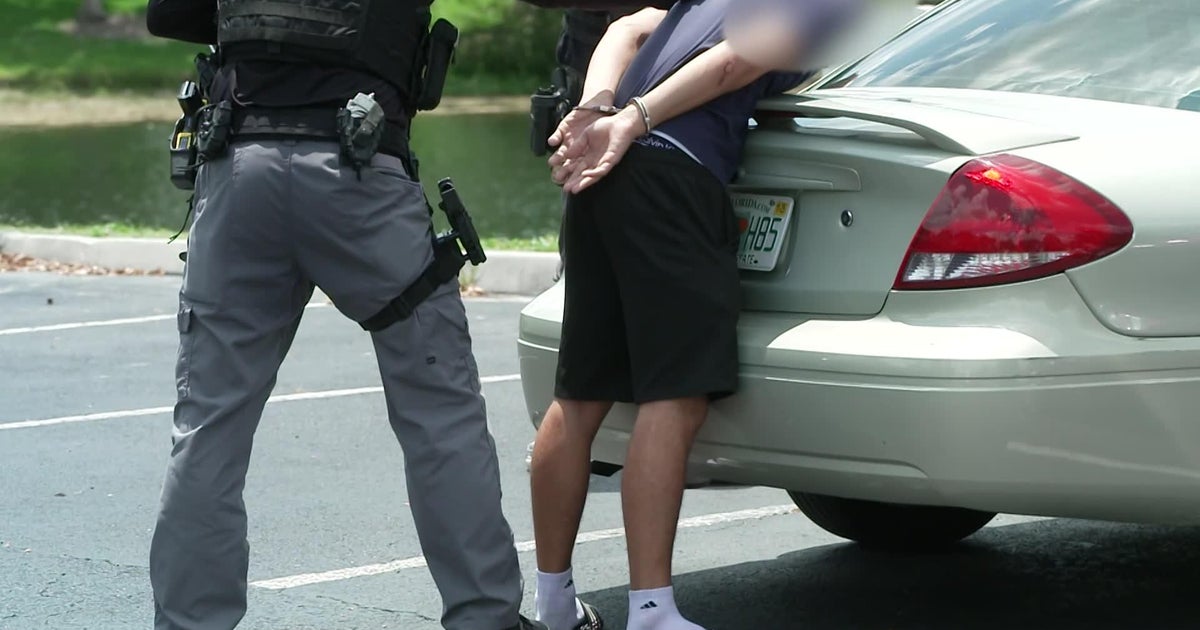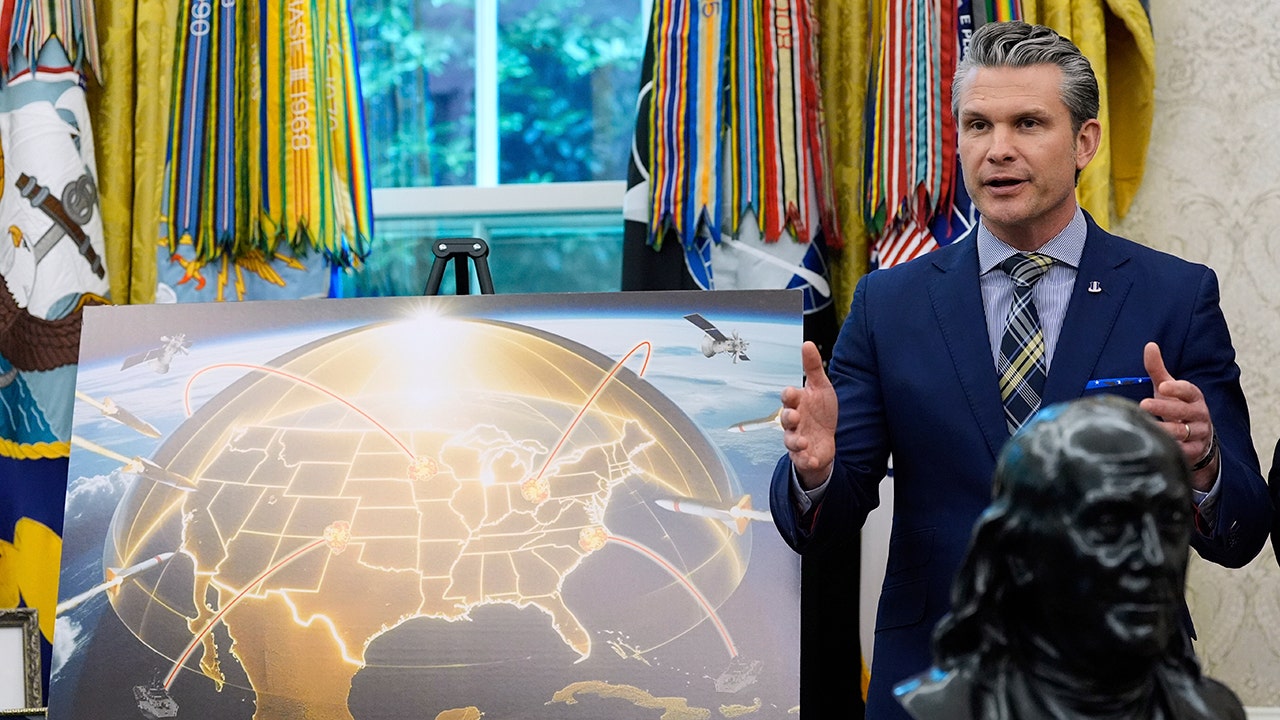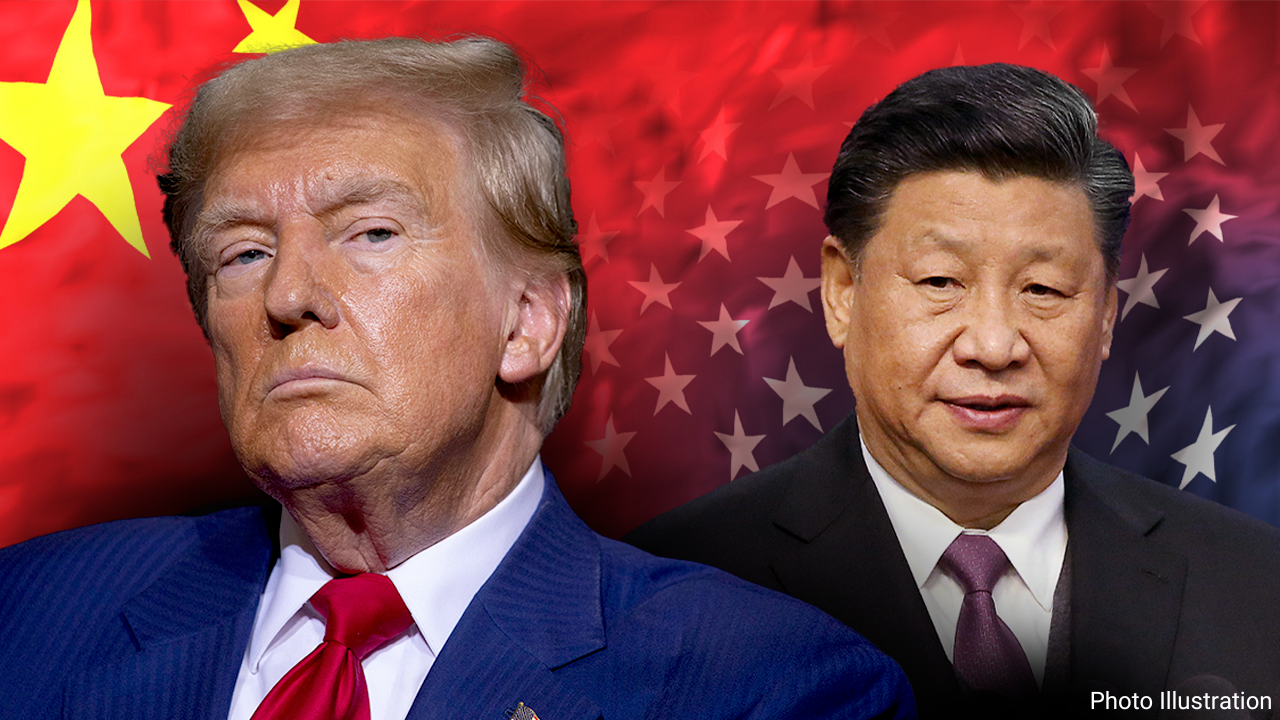Austin, TX
Texas House approves scaled-back bill to create new border patrol unit

House Bill 20, by Rep. Matt Schaefer, R-Tyler, would have created a new “Border Protection Unit,” giving Gov. Greg Abbott the sole authority to select its leader. The border force would have consisted of licensed law enforcement officers and civilians, who, after training, could arrest and detain migrants for illegally crossing the border. HB 20 also would have allowed prosecutors to charge both migrants and U.S. citizens with a third-degree felony for trespassing on private property while crossing into Texas “from any neighboring jurisdiction.”
Schaefer told Community Impact that allowing everyday Texans to join the border protection unit would ensure Texas has a “sustainable workforce” at the border. The Texas Department of Public Safety currently has the primary presence there, alongside members of the Texas National Guard. But Schaefer said law enforcement currently does not have the capacity to deal with high rates of immigration and also stop the flow of fentanyl, a deadly opioid, into Texas.
“We have a part-time workforce applied against a very full-time threat,” Schaefer said.
House Democrats and other immigration advocates said the bill would have emboldened “vigilantes” to go after migrants.
“This legislation is going to create a civilian police force with police powers, who will be able to travel through any of our counties or any of our cities, to set up checkpoints—to question us … without consequences and with immunity,” said Rep. Victoria Neave Criado, D-Dallas. “Imagine checkpoints outside of churches, outside of schools, outside of neighborhoods, whether it’s an Asian community in Houston; a Latino community in Dallas or the Valley.”
Neave Criado chairs the House’s Mexican American Legislative Caucus and led the charge to kill the bill. Throughout the day, Democrats stalled by prolonging discussion on other bills. When HB 20 reached the floor, they raised multiple points of order—a procedural tactic typically used to delay or kill legislation.
The third and final point of order, by Rep. Rafael Anchía, D-Dallas, argued that the bill contained multiple subjects, and the bill’s caption, which explains what the bill would do, did not give reasonable notice of the subjects.
Phelan accepted the point of order, sending the bill back to the House State Affairs Committee. The bill would have allowed Abbott to declare that “a state of invasion or imminent danger … exists,” which Phelan said is a declaration of war and must be included in the caption.
The decision was made after a 10 p.m. deadline for bills to be placed on a final House calendar. According to chamber rules, all House bills must receive initial passage by May 11 and each day’s calendar must be finalized 36 hours in advance.
After HB 20 was defeated, Rep. Ryan Guillen, R-Rio Grande City, revived portions of the bill by adding them to his own legislation, HB 7, as amendments.
The updated border bill
Major elements of Schaefer’s bill were not included in HB 7. The scaled-back proposal still creates a border protection unit, but only licensed peace officers would be able to join. People who have been convicted of a violent offense or dishonorably discharged from the military would not be eligible to join the unit.
Additionally, the unit’s operations would be limited to counties along the border. Commissioners courts in those counties also must provide written consent in order for the border force to set up shop.
Under the bill, members of the border protection unit would not be allowed to detain migrants under 10 years old for border-related crimes.
Abbott would still have full control of the hiring and firing of the new border protection chief.
HB 7 passed with an 88-56 vote May 10. It now heads to the Senate.
The House debate on border bills came days before the end of Title 42, a pandemic-era policy used to expel migrants seeking asylum. Title 42 expires at 11 p.m. May 11.
During a May 8 news conference, Abbott announced that specially trained Texas National Guard members were being deployed to “hotspots” along the border as part of a new Texas Tactical Border Force. Abbott said the Biden administration expects approximately 13,000 people will illegally cross the border after Title 42 expires.
“President Biden is laying down a welcome mat to people all across the world, saying the U.S. border is wide open,” Abbott said.
HB 20 is the second bill House Democrats have forced back to committee. On May 2 and 5, Rep. Mary González, D-Clint, raised successful points of order on Senate Bill 14, which would ban transition-related treatments for Texas youth. SB 14 is up for discussion in the House on May 12.

Austin, TX
Texas vs Clemson Super Regional weather updates: Softball game delayed due to lightning
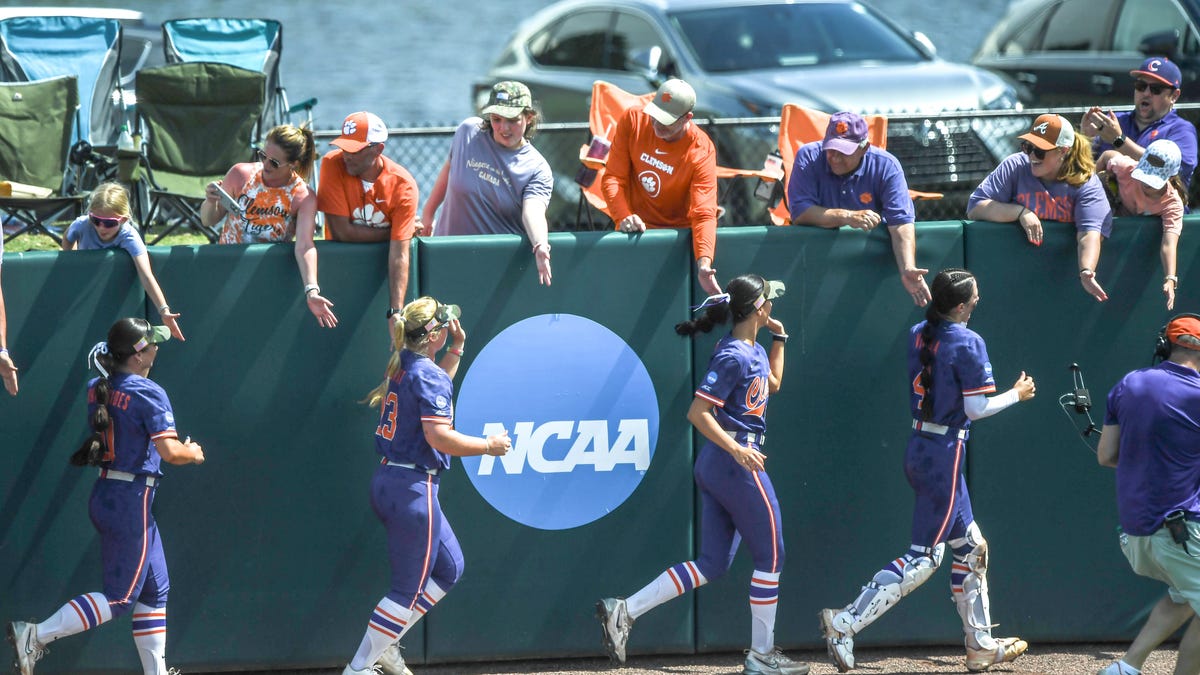
How the SEC’s softball dominance could carry it through to the Women’s College World Series
The Oklahoman’s Jenni Carlson shares the top storylines she’s following through the NCAA softball tournament, starting with the SEC’s biggest strengths.
What’s an NCAA softball tournament without a weather delay?
Just four pitches into the second game of the 2025 Super Regionals, there is a weather delay in the matchup between No. 6 Texas and No. 11 Clemson at Red & Charline McCombs Field in Austin, Texas.
Clemson’s Alex Brown led off the game with a single and Maddie Moore fell behind 0-2 before lightning struck within eight miles of the stadium, causing the umpires to have to call a lightning delay. The game cannot start until at least 30 minutes following the last lightning strike.
Here’s the latest on the weather updates from Texas-Clemson from the Austin Super Regional:
Texas-Clemson weather updates
All times Eastern.
9:39 p.m.: Another lightning strike, reset the clock and add 30 more minutes.
9:21 p.m.: Texas’ softball social media tweeted out that there was another lightning strike at 9:21, meaning the clock resets to 30 minutes from the strike.
9:07 p.m.: The Texas-Clemson matchup in the Austin Super Regional has entered a weather delay just four pitches into the game.
Austin, TX
'terrace mountain residence' cantilevers over austin with design by a parallel architecture
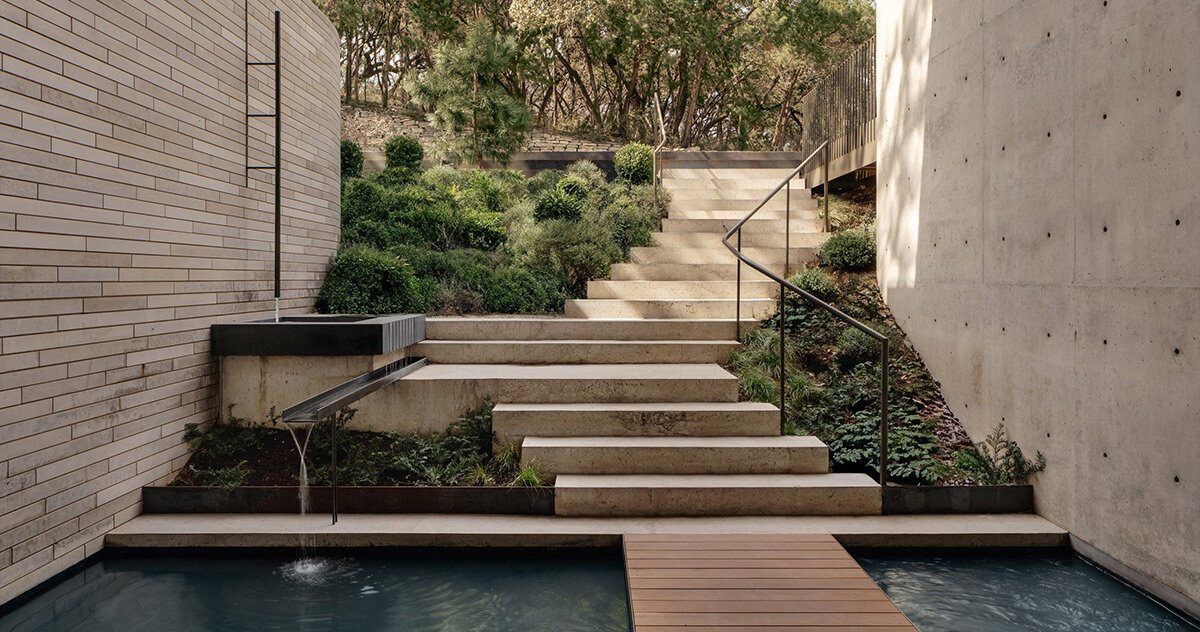
a parallel architecture Shapes Space Through Material
The first glimpse of A Parallel Architecture’s newly completed Terrace Mountain Residence suggests a defiance of gravity. Sited above the wooded slopes of Westlake Hills suburb of Austin, Texas, the home seems to hover between sky and earth. The approach begins with a suspended bridge and ends at a glass-framed threshold that opens to the city skyline beyond. The architects, working closely with Arrowhead Construction, guides the structure into a dialogue with its terrain, not through imitation but by contrast. Steel and glass are braced against the softness of tree canopies and stone.
Materiality shapes the home’s atmosphere. A Parallel Architecture draws from a palette of concrete, steel, and local stone, all anchored by dark-stained wood elements that warm the otherwise elemental geometry. At once muscular and restrained, the home’s outer shell opens selectively, revealing framed glimpses of Austin’s shifting daylight. Interior transitions, between the entry bridge, central living space, and stepping outdoor terraces, are expressed through changes in texture and light, rather than walls.
images © Chase Daniel
terrace mountain Residence opens onto austin landscape
Suspension becomes a recurring theme throughout A Parallel Architecture’s Terrace Mountain Residence. The team positions the main living areas above a sloping terrain, leaving the ground untouched and shaded beneath. From this raised perch, the structure cantilevers gently over an infinity pool that seems to dissolve into the hill country. The reflection pond that flows beneath the house does more than echo its silhouette. It threads through the site like a quiet architectural counterpoint, drawing the landscape into the design with a sense of rhythm and ease.
The heart of the dwelling lies in a luminous volume that houses the living room, kitchen, and dining space. Here, the architects work with interior designer Allison Burke to maintain a restrained interior language, allowing large panels of glass to turn the city into an active backdrop. The kitchen is centered around a singular marble island, almost monastic in its precision, and balanced by cabinetry that disappears into the surrounding walls.
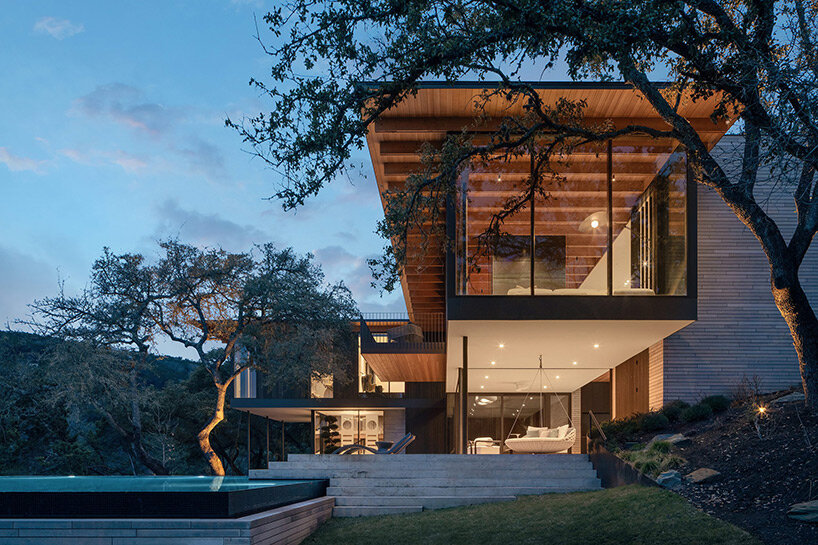
the Terrace Mountain Residence hovers above the wooded slopes of Westlake Hills in Austin, Texas
Descending Into Landscape
In the main suite of the Terrace Mountain Residence, A Parallel Architecture offers an intimate composition of proportion and detail. A fireplace floats at the center of the room, less a barrier than a suggestion, gently separating the sleeping area from a sitting alcove. Dual bathrooms and closets recede discreetly along the perimeter, their presence registered more by surface and material than enclosure.
Along the lower level, the architecture extends downward without losing its clarity. The design team organizes this part of the home around the slope itself, creating guest suites and a double-height media room that open directly to the outdoor terrace. The change in elevation is embraced, not masked. Inside and outside, the shift in grade becomes a way to introduce shade and intimacy among the surrounding foliage.
The landscape design complements the home without overstating its presence. Much of the natural site is preserved, allowing native plantings and shaded groves to surround the exterior. An infinity pool, set along the home’s axis, acts as both a mirror and a margin. It reflects the open sky and defines the boundary of the terrace. The outdoor kitchen is tucked within a breezeway, kept close but visually quiet.
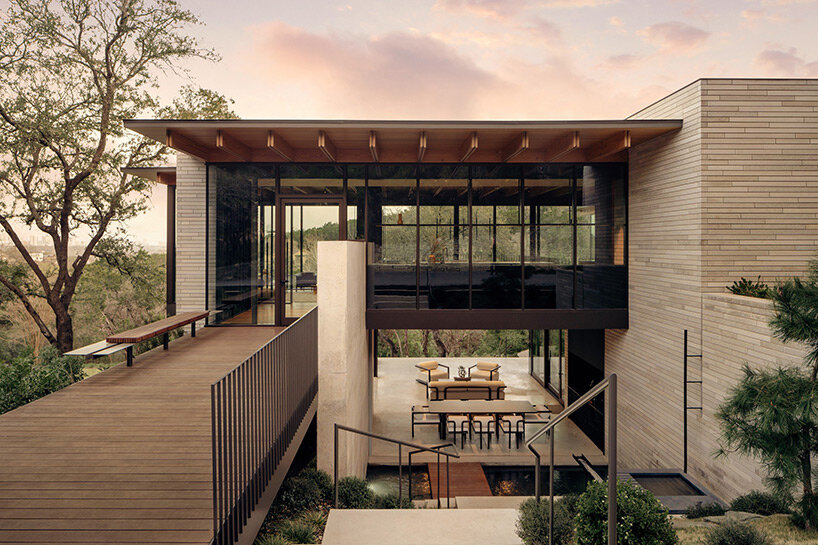
a floating bridge that leads to a glass-framed threshold overlooking the city skyline
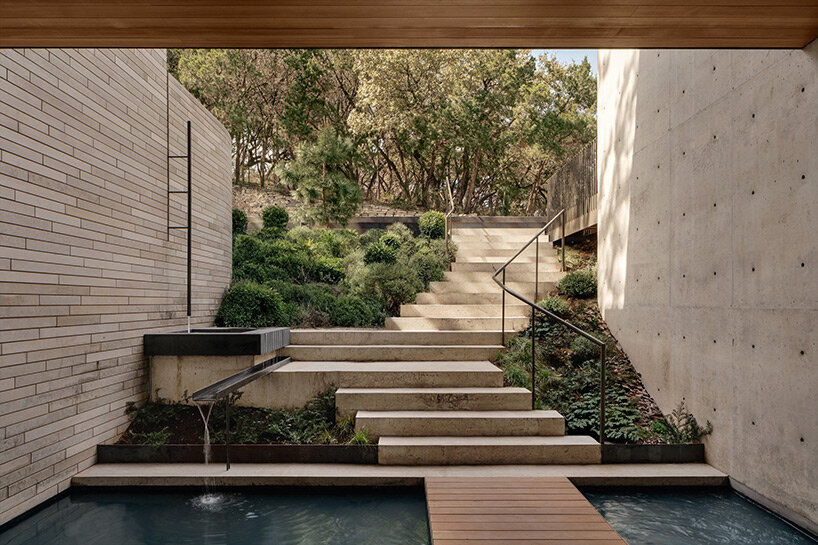
a reflection pond threads beneath the house to create an integration between architecture and terrain
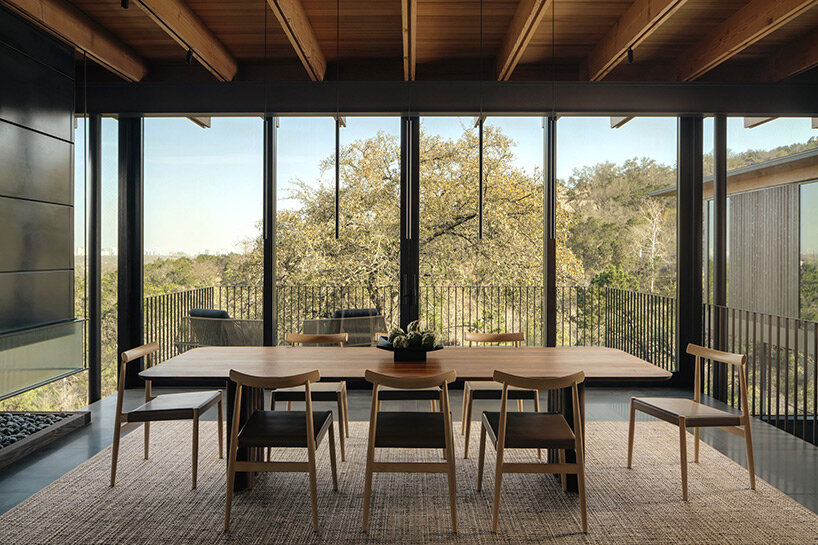
the concrete, steel and wood structure opens onto framed views of the surrounding landscape
Austin, TX
Watershed Health rolls out large-scale data sharing platform across Austin, Texas, region
_0.jpg?VersionId=cUUejUp1URIVr3e_d3iv5EquebDUVy7t)
-

 Culture1 week ago
Culture1 week agoBook Review: ‘Original Sin,’ by Jake Tapper and Alex Thompson
-

 News1 week ago
News1 week agoAs Harvard Battles Trump, Its President Will Take a 25% Pay Cut
-

 Education1 week ago
Education1 week agoVideo: Opinion | We Study Fascism, and We’re Leaving the U.S.
-

 Politics1 week ago
Politics1 week agoRepublicans say they're 'out of the loop' on Trump's $400M Qatari plane deal
-

 News1 week ago
News1 week agoMenendez Brothers Resentenced to Life With Parole, Paving Way for Freedom
-

 Technology1 week ago
Technology1 week agoLove, Death, and Robots keeps a good thing going in volume 4
-

 Education1 week ago
Education1 week agoA $5 Billion Federal School Voucher Proposal Advances in Congress
-

 Technology1 week ago
Technology1 week agoMeta’s beef with the press flares at its antitrust trial
